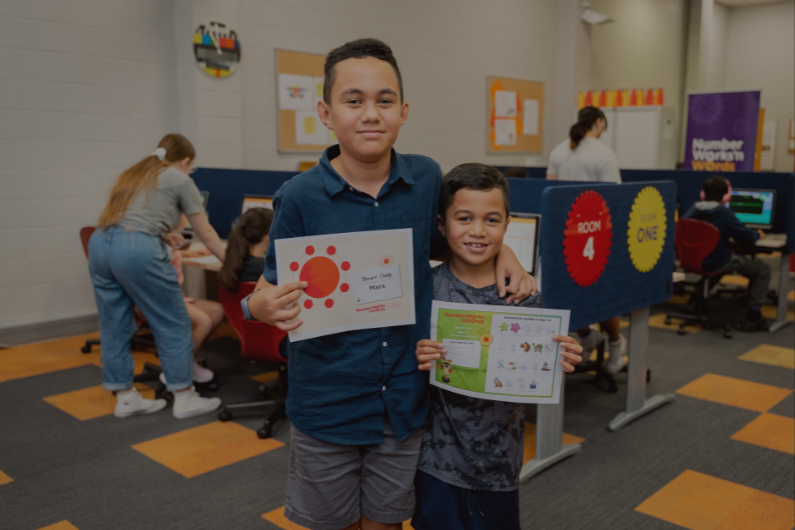How Cambridge (CAIE) works for students in New Zealand

Cambridge is short for the University of Cambridge International Examinations (CAIE). It offers internationally recognised qualifications in academic and vocational subjects. While the organisation behind the exams is based in the UK, the CAIE curriculum is implemented worldwide and is not based on the UK national curriculum.
Cambridge International programmes typically include the Cambridge Primary, Cambridge Secondary 1, Cambridge IGCSE (International General Certificate of Secondary Education), and Cambridge International AS & A Levels. Schools can choose which stages of the Cambridge curriculum they wish to implement based on their educational goals and the needs of their students.
Structure
CAIE is a three-year programme. Each year, your child will take several subjects at either IGCSE, AS, or A2. Although AS is a recognised stand-alone qualification, AS and A2 together form the full A-Level qualification.
Year 11
In Year 11 your child studies roughly five Cambridge subjects. The vast majority of students carefully consider where they want to be 10 years down the line, and their career prospects, and pick subjects accordingly. The IGCSE level is an opportunity for your child to experience what the curriculum has to offer and to explore what they want to study further.
This first year allows them to get used to the curriculum structure, the marking system and the exam style while deciding where their interests lie. Think about the future, but keep your child’s options open, and don't specialise too heavily too early unless your child is sure.
IGCSE does not contribute towards University Entrance. It does however serve as a foundation for AS and A2
E.g. In Year 11 their child could pick the following subjects:
- IGCSE Maths
- IGCSE English
- IGCSE Physics
- IGCSE Business Studies
- IGCSE History
Each subject is assessed separately and the grade they attain for one subject has absolutely no effect on their grade for any other subjects. The subjects are designed so that there is a continuation between different levels. For example, AS Maths is a harder version of IGCSE Maths and directly draws on the material that your child studied at IGCSE.
Year 12
In Year 12, most schools will recommend students take around four or five subjects again. Many students will be taking all subjects at the AS level. AS Subjects contribute towards University Entrance.
Your child has a few choices here:
- Continue with their IGCSE subjects at the AS Level
- Pick up new IGCSE subjects
- Pick up new AS subjects without having done IGCSE
It is not compulsory to have done a subject at IGCSE to do it at AS, but it's easier that way – some schools may require the students to get special approval to skip IGCSE.
Year 13
In Year 13, your child needs to think very carefully about their subjects. This is their last chance to contribute towards their University Entrance qualification
The options your child has now are as follows:
- Continue with their AS subjects at the A2 Level
- Pick up new AS subjects
There's no point picking IGCSE subjects now as they can't be used for University Entrance, instead, your child would pick only AS or A2 Subjects.
One potential approach is to pick their best AS subjects (typically 3 to 4) and continue these at the A2 level. The A2 level should be thought of as the second part of this whole A-level programme, therefore your child can’t take a subject at the A2 level if your child has not done the AS counterpart.
Alternatively, your child can pick more subjects at the AS level. Students choosing this path opt to have a broader knowledge base rather than specialising/gaining a deeper understanding of what they have already studied.
Students choosing this option are not disadvantaged for University Entrance, AS is a perfectly acceptable stand-alone qualification that does count towards University Entrance. Some high-achieving students skip Year 13 altogether and go directly into University using their Year 12 AS results.
Most students do a mixture of the above two options.
Compulsory Subjects and University Entrance
The following subjects are compulsory as they form the minimum requirements to get into a University in New Zealand. Getting a good enough result for these subjects will fulfil their Numeracy and Literacy requirements
- Maths is compulsory at IGCSE
- English is compulsory at IGCSE and AS
In many schools, Physical Education is a required subject. Aside from these subjects, your child is free to choose whatever subjects your child wishes. Aside from Numeracy and Literacy requirements, University Entrance is determined by their AS and A2 results.
Assessment
With CAIE in New Zealand, your child’s grade for that whole year is completely determined by external examinations held at the end of the year in October/November.
For each subject, there might be 1 to 3 exam papers covering different aspects of the curriculum. For example, the sciences will typically have a multiple-choice paper, a structured answer paper and a practical paper. Each paper would be examined separately with each exam session lasting between 1 to 3 hours.
All the papers across all the subjects will be examined in this manner for a few weeks in no particular order. Most schools will have tests and mock exams, but these are used only as a guideline to track progress and give a prediction of how well a student might do in the external exams. None of these results will affect their final results at the end of the year.
At the end of each exam session, all the exams are collected and sent to be marked externally.
How to Understand Exam Results
For every subject your child takes, their results will come in the form of a single overall grade for that subject. This is derived from the percentage of questions that they’ve correctly answered. The following is the grade breakdown:
- A* = 90%
- A = 80%
- B = 70%
- C = 60%
- D = 50%
- E = 40%
- Ungraded = <40%
Your child can generally resit each exam again the following year in May/June if your child is not happy with their results for a subject. For example, if your child gets a B for IGCSE Chemistry, they may continue with AS Chemistry normally the following year while studying for IGCSE Chemistry in their own time. Most schools that offer Cambridge will offer the resit option.
What if my child is underperforming?
Don’t panic. Instead, acknowledge your child's efforts and strengths, and offer them support and encouragement. Let them know that you are proud of them regardless of their grades and that you want to help them improve their skills and reach their goals.
Whilst it is natural to be concerned, it is also important to remember that it’s just an exam, and it doesn't define your child's intelligence, capabilities, or potential.
The next step is to understand your child's strengths and weaknesses in the different areas of CAIE. Your child can do this by reviewing their test results, talking to their teachers about their performance, or booking a free assessment with the NumberWorks’nWords team. This assessment can help your child identify which areas their child needs to focus on, and which areas they are excelling in.
Why our Cambridge tutoring programmes are more effective than practice alone
If your child is lacking essential skills or grappling with question structures, simply practising numerous questions may not lead them to the correct answers. What they might require is personalised assistance—someone who can address their questions and clarify concepts at their own pace.
At NumberWorks’nWords, our experienced team has crafted programmes tailored to offer children the necessary support for Cambridge exams.
Our programmes aim to enhance your child's numeracy and literacy skills by reinforcing their foundational knowledge, and prioritising understanding over mere memorisation. If your child encounters challenges with a particular topic, our tutors can refine their programme to ensure thorough comprehension is achieved.



